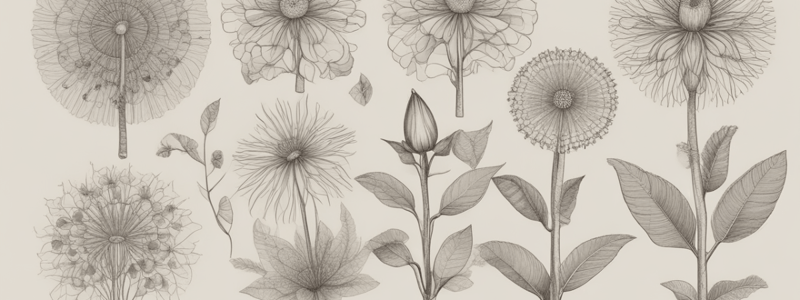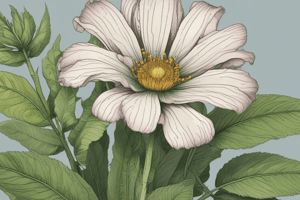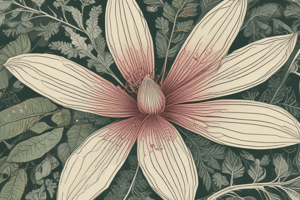Podcast
Questions and Answers
What is the primary location where the seeds of an angiosperm develop?
What is the primary location where the seeds of an angiosperm develop?
- Inside the plant organs (correct)
- In the soil
- In the roots
- On the surface of the leaves
What is the main function of roots in angiosperms?
What is the main function of roots in angiosperms?
- To produce seeds
- To grow towards the sunlight
- To absorb water and nutrients (correct)
- To make food through photosynthesis
What is the term for the process by which seeds are spread out to grow in new locations?
What is the term for the process by which seeds are spread out to grow in new locations?
- Germination
- Flowering
- Seed Dispersal (correct)
- Photosynthesis
What is the characteristic of angiosperms that allows them to grow in various habitats?
What is the characteristic of angiosperms that allows them to grow in various habitats?
What is the process by which a seed begins to grow when conditions are suitable?
What is the process by which a seed begins to grow when conditions are suitable?
What is the purpose of the pollen in the flowers of an angiosperm?
What is the purpose of the pollen in the flowers of an angiosperm?
Flashcards are hidden until you start studying
Study Notes
Overview of Angiosperms
- Angiosperms are vascular plants comprising stems, roots, and leaves.
- Seeds are contained within flowers, classifying them as flowering plants.
- They represent the majority of plant species on Earth.
- Seeds develop inside plant organs and form fruit, aiding in reproduction.
Key Characteristics of Angiosperms
- Most advanced and beneficial group of plants with the ability to thrive in diverse habitats.
- Can grow as various forms, including trees, herbs, shrubs, and bushes.
Germination Process
- The seed germinates when environmental conditions are favorable.
- Roots typically grow underground, anchoring the plant and absorbing nutrients.
Formation of Plant Structures
- A stem emerges, along with leaves, allowing the plant to perform photosynthesis and produce its own food.
Flowering and Reproduction
- Pollen produced in flowers is crucial for seed production and the continuation of the species.
Seed Dispersal Mechanism
- Seeds are dispersed to minimize competition with the parent plant, allowing them to grow in new locations.
Examples of Flowering Plants
- Notable flowering plants include sunflowers, orchids, and tomato plants.
Studying That Suits You
Use AI to generate personalized quizzes and flashcards to suit your learning preferences.




